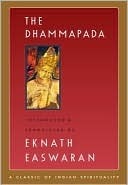More on this book
Community
Kindle Notes & Highlights
the best wealth, trust the best kinsman,
Attachment to pleasure is one of the most serious obstacles to spiritual growth.
Aspirants can lose themselves in pleasure and abandon their quest for life’s supreme purpose (209);
addicted to having pleasant things and peop...
This highlight has been truncated due to consecutive passage length restrictions.
the pleasant contains the unpleasant.
we never really experience the world; we experience only our own nervous system.
Conquer anger through gentleness, unkindness through kindness, greed through generosity, and falsehood by truth.
“People will blame you if you say too much; they will blame you if you say too little; they will blame you if you say just enough.” No one in this world escapes blame.
three basic kinds of impurity: greed, hatred, and infatuation. “They are known as impurities,”
The worst of all such taints is ignorance, because it prevents us from seeing other impurities that consume us from within (243).
There is no fire like lust, no jailer like hate, no snare like infatuation, no torrent like greed.
It is easy to see the faults of others; we winnow them like chaff. It is hard to see our own; we hide them as a gambler hides a losing draw.
There is no path in the sky;
dharma was an ancient concept in India even when the Buddha was born. The
root dhri, “to support.”
core meaning is simply “that which supports.”
Dharma is the very underpinning of existence, the underlying unity of life, the essential support of all;
it stands for the cosmic order – the order of an ...
This highlight has been truncated due to consecutive passage length restrictions.
The true follower of the dharma is that person who has passed beyond the reach of good and evil (267): that is, who no longer has to deliberate between right and wrong;
They are wise who are patient, and free from hate and fear.
immortal joy of nirvana until you have extinguished your self-will.
Verses 277 through 279 present the three marks or characteristics of all conditioned things (samskaras): impermanence (anitya),
suffering (duhkha), and the absence of a personal self (anatman).
Right understanding, the first step on the Eightfold Path, means seeing clearly that such flaws are an inescapabl...
This highlight has been truncated due to consecutive passage length restrictions.
The other seven steps are there to enable us to build our lives on the only foundation that...
This highlight has been truncated due to consecutive passage length restrictions.
Of paths the Eightfold is the best; of truths the Noble Four are best; of mental states, detachment is the best;
All created things are transitory;
“I will make this my winter home, have another house for the monsoon, and dwell in a third during the summer.” Lost in such fancies, one forgets his final destination.
is hard to leave the world and hard to
live in it, painful to live with the worldly and painful to be a wanderer.
Hell in Buddhism really is educative, not vengeful, and it is not the sentence of a wrathful deity but the natural, unavoidable result of actions that violate dharma.
one gets the opportunity to correct one’s direction in a new life.
“The mind is its own place,” Milton says in Paradise Lost, “and in itself / Can make a heaven of hell or hell of heaven.”
According to the Tibetan Book of the Dead, these desires remain in consciousness at death.
they condition the choice of a new context for another life,
desires keep us leaping from life to life pursuing ever-elusive satisfaction
Vibhava-trishna,
draws a temporary cover of oblivion over the burdens and stresses of selfish behavior.
any activity that is potentially self-destructive stems from the urge for extinction. Even that second double martini intended to deaden the strains of the day is an example of the urge to escape oneself
The Sanskrit name for a Buddhist monk is bhikshu, from the root bhiksh, “to beg for alms.”
That one I call a brahmin who is ever true, ever kind. 409 Such a one never asks what life can give, only ‘What can I give life?’
415 That one I call a brahmin who has turned his back upon himself. Homeless, such a one
is ever at home; egoless, he is ever full.
That one I call a brahmin whose way no one can know. Such a one lives free from past and future, free from decay and death.
Possessing nothing, desiring nothing for their own pleasure, their own profit, they have become a force for good, working for the freedom of all.


